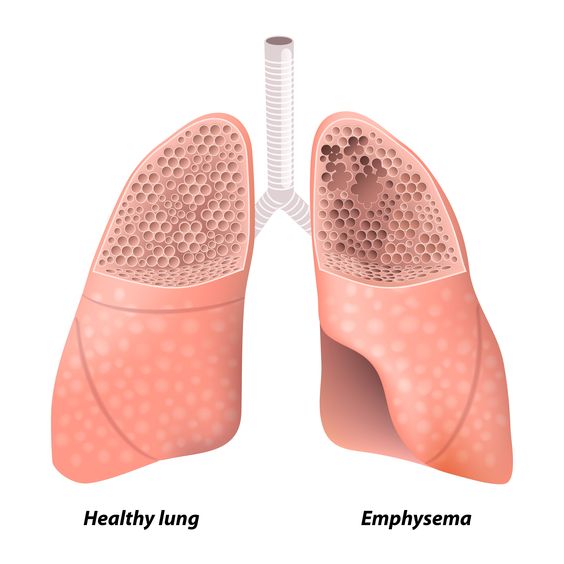Introduction
Emphysema is a chronic lung condition that falls under the umbrella of chronic obstructive pulmonary disease (COPD). This progressive disease primarily affects the alveoli, which are tiny air sacs in the lungs responsible for the exchange of oxygen and carbon dioxide. Over time, emphysema causes the walls of these air sacs to weaken and rupture, leading to the formation of larger, less efficient air spaces. This damage reduces the surface area available for gas exchange, making it difficult for the lungs to effectively transfer oxygen into the bloodstream and remove carbon dioxide.

The primary cause of emphysema is long-term exposure to airborne irritants, with smoking being the most significant risk factor. Other irritants include air pollution, chemical fumes, and dust. In rare cases, emphysema can also be caused by a genetic deficiency of a protein called alpha-1-antitrypsin, which helps protect the lungs from damage.
Symptoms of Emphysema
Emphysema often develops gradually, with symptoms becoming more apparent as lung damage progresses. Common signs and symptoms include:
- Shortness of breath: Initially noticeable during exertion, but eventually occurring even at rest.
- Wheezing: A whistling sound during breathing, indicating airway narrowing.
- Chronic cough: Often accompanied by phlegm production, particularly in the mornings.
- Chest tightness: A feeling of pressure or discomfort in the chest.
- Fatigue: Persistent tiredness and lack of energy.
- Bluish tint to the skin or lips (cyanosis): A sign of insufficient oxygen in the blood.
Diagnosing Emphysema
Diagnosing emphysema involves a comprehensive evaluation of medical history, physical examination, and diagnostic tests. Physicians typically inquire about smoking history, exposure to other irritants, and family history of lung conditions. Physical examination may reveal diminished breath sounds and other signs of respiratory distress.
Diagnostic tests for emphysema include:
- Pulmonary function tests (PFTs): Measure lung capacity, airflow, and gas exchange. Spirometry, a common PFT, assesses how much air you can inhale and exhale, and how quickly you can exhale.
- Chest X-ray: Can reveal structural changes in the lungs, such as enlarged air spaces, characteristic of emphysema.
- High-resolution computed tomography (HRCT) scan: Provides a more detailed image of the lungs, helping identify the extent and pattern of emphysema.
- Arterial blood gas analysis: Measures the levels of oxygen and carbon dioxide in the blood, revealing the effectiveness of gas exchange in the lungs.
Treatment Options for Emphysema
While there is no cure for emphysema, various treatments can help manage symptoms, slow disease progression, and improve quality of life. The primary goals of treatment are to alleviate symptoms, prevent exacerbations, and enhance overall lung function.
Treatment options include:
- Smoking cessation: Quitting smoking is the most crucial step in managing emphysema. Smoking cessation programs, counseling, and nicotine replacement therapy can assist with quitting.
- Medications: Bronchodilators help relax and open airways, relieving shortness of breath. Inhaled corticosteroids reduce inflammation in the airways, improving breathing and decreasing exacerbations. Some patients may require supplemental oxygen therapy to increase blood oxygen levels.
- Pulmonary rehabilitation: A comprehensive program combining exercise training, education, and breathing techniques. It helps improve lung capacity, manage shortness of breath, and enhance overall well-being.
- Surgery: In select cases, surgical interventions, like lung volume reduction surgery or lung transplantation, may be considered for patients with severe emphysema.
Living with Emphysema
Living with emphysema requires ongoing management and lifestyle adjustments. Adhering to the prescribed treatment plan, including taking medications as directed and engaging in pulmonary rehabilitation, is essential. Avoiding exposure to irritants, like smoke and air pollution, is crucial to prevent further lung damage. Maintaining a healthy weight, eating a nutritious diet, and getting enough rest are vital for overall health and well-being. Regular check-ups with a healthcare provider allow for monitoring disease progression and adjusting treatment as needed. Joining support groups can provide emotional support and practical advice for managing life with emphysema.

.jpg)